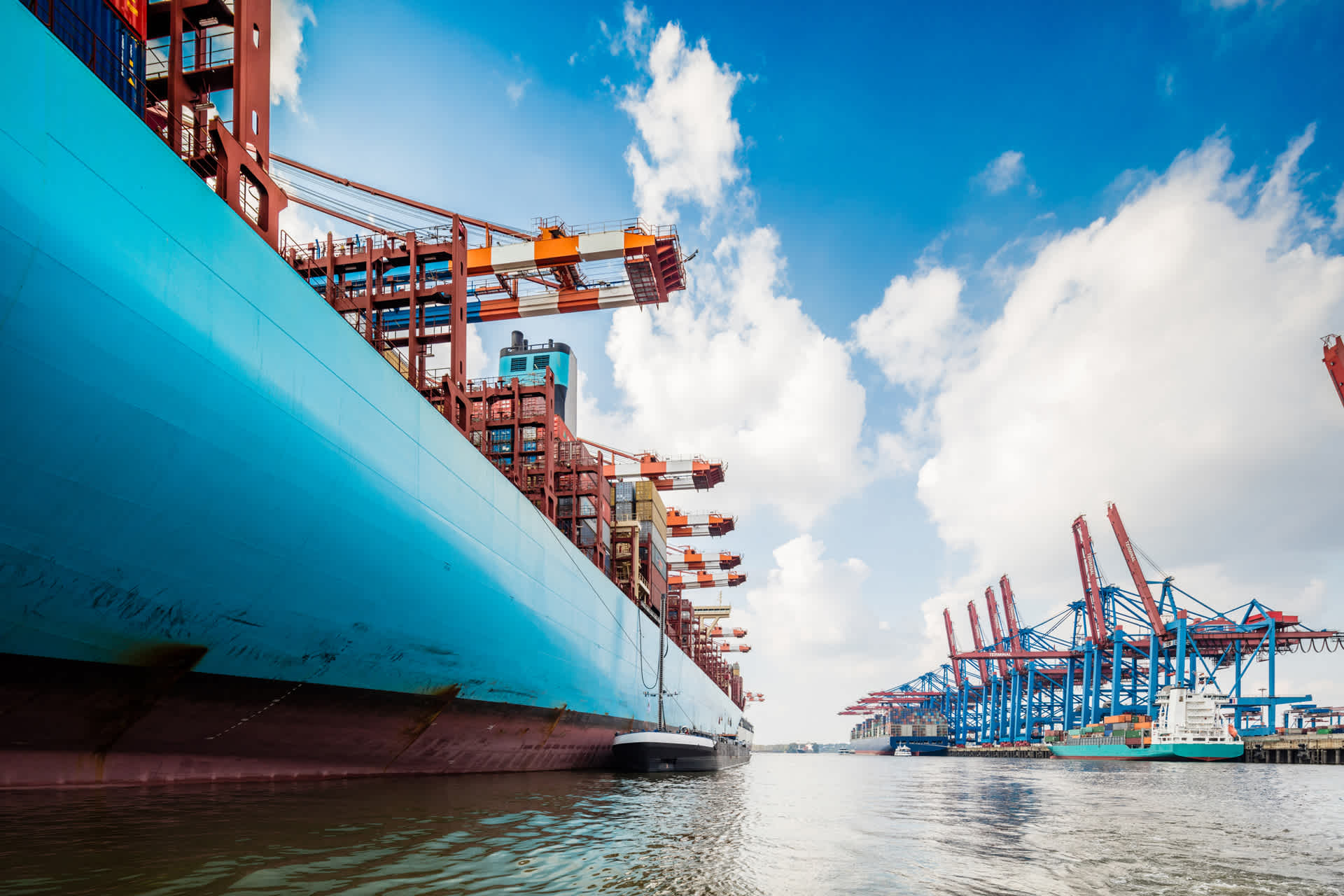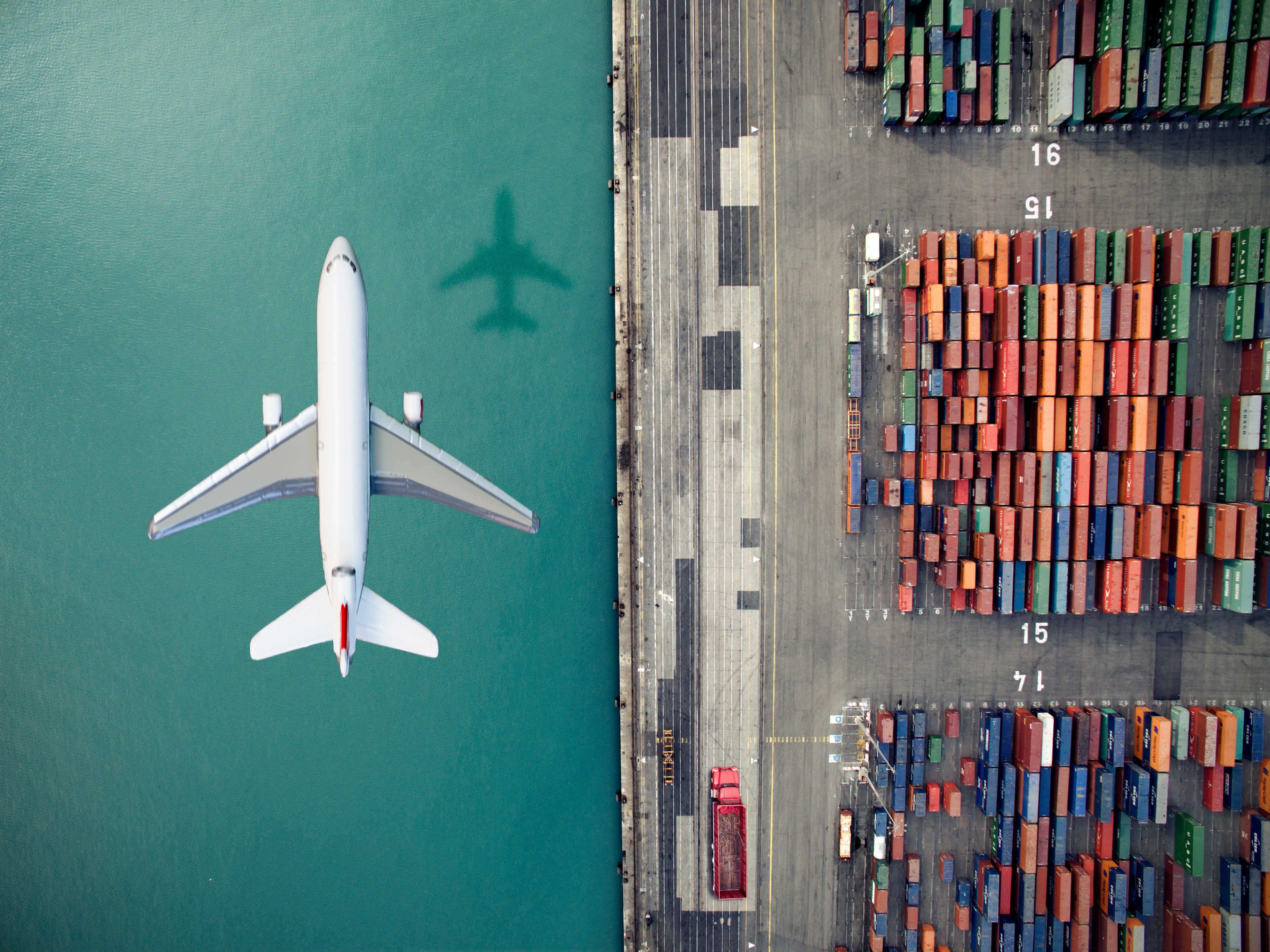Global Logistics Update
Freight Market Update: March 15, 2022
Ocean and air freight rates and trends; customs and trade industry news plus Covid-19 impacts for the week of November 16, 2021.
Freight Market Update: March 15, 2022
The State of Trade: Sanctions & Supply Chains
Wednesday, March 23 at 9:00 am PT / 12:00 pm ET
Countries around the world are enacting trade and financial sanctions in response to the developing situation in Ukraine. But what exactly are sanctions? How will they rearrange global trade? Our panel of economic experts will discuss all this, plus provide a closer look at the supply chain impacts from the crisis in Ukraine.
Ocean Freight Market Update
Asia → North America (TPEB)
- Covid-19 outbreaks in China and resultant lockdown/ restriction measures disrupt production and trade activity in Southern (Shenzhen/Dongguan) and Eastern (Shanghai) regions. Ocean carriers are assessing impacts to bookings and have not yet announced any blank sailings. Additional volatility drivers in the market remain: severe congestion, equipment imbalances, sliding vessel schedules, port omissions, blank sailings, and increased fuel charges. The moving market remains primarily at premium levels with some pockets and routings open for FAK.
- Rates Rate levels remain elevated and the premium market is strong.
- Space Critical
- Capacity/Equipment Critical/Severe Undercapacity
- Recommendation Book at least 3-4 weeks prior to CRD. Consider premium options. Be flexible in regard to equipment and routings. Check closely with suppliers to understand any Covid-related impacts or changes to production outputs and forecasts.
Asia → Europe (FEWB)
- COVID surges in China with lockdown in Shenzhen and restrictions in Shanghai and a number of other cities having a business impact and putting pressure on ocean shipping volumes. Factory production within Shenzhen has been limited as employees are not able to go to work. Trucker shortage is making it difficult to move containers to the ports. There is available space on FAK and spot across all alliances but carriers are still not open for more long-term named accounts. It is expected that there will likely be some port omissions and blank sailings announced by carriers as a response to recent developments.
- Rates Rates remain at a high level but have been on a downward trend throughout March due to a slowdown in the market.
- Space Tight space situation
- Capacity/Equipment Severe equipment shortage across all Asia origins.
- Recommendation Book at least 3 to 4 weeks prior to CRD. Consider premium options, which may be limited. Be flexible in regard to equipment.
Europe → North America (TAWB)
- Congestion at USEC ports shows no improvement so far with vessel waiting time still between 3 and 14 days. USWC waiting time is slightly improving in Los Angeles but overall still around 35 days. Hamburg CTA is still heavily congested with issues on empty release and delivery of full containers.
- Rates Ocean levels continue to raise with PSS and GRI increase announced for March and April rates.
- Space Critical, especially to the USWC
- Capacity/Equipment Capacity remains tight for both North Europe and Mediterranean services. Better equipment availability at port. Shortages remain at inland depots.
- Recommendation: Book 5 or more weeks prior to CRD. Request premium service for higher reliability and no-roll guarantees.
Indian Subcontinent → North America
- Equipment shortages reported at major ports. Over the past few months major ports such as Nhava Sheva and Mundra have been able to keep up with demand for empty equipment while smaller ports like Kolkata and Tuticorin really struggled. As of recently, Flexport is seeing reports of equipment deficits across all major ports in India. This will have a downstream effect on the smaller ports as well as Inland container depots which are often replenished by these larger ports.
- Rates Maintained through 2H March. Premium rate levels should be expected for smaller Indian ports and Bangladesh as demand exceeds vessel/equipment supply.
- Space to the USWC is and will remain a challenge into 2022. Port omissions on services to the USWC continue to cut capacity out of the Indian sub-con. Recommendation is to move on premium services. Space to the USEC will be difficult into Savannah, Charleston, and New York until April as bunched vessels off the coast of USEC are resulting in longer turn-around time back to origin and port of discharge omissions. This leaves a gap of sailings for the most consistent services typically relied upon for ISC to the USEC.
- Equipment deficits are being reported across many ports in India. Most affected are the S/SE ports, Kolkata, and Inland container depots in North India.
- Recommendation remains to load via wet port and avoid Inland container depots when possible. ICDs are a chokepoint for containers which often leads to delays in SO release. Booking on some premium services will give you priority on equipment.
North America → Asia
- Vessel arrivals and available capacity remain fluid for USWC POLs. Rail availability over the USWC is limited as carriers are strictly adhering to allocations. USEC situation sees Savannah operations improving however port omissions continue for the South Atlantic affecting both Savannah and Charleston ports. Erratic vessel schedules continue to create void sailings and delays in schedules creating significant challenges with posted earliest return dates and vessel cut-offs at the port.
- Rates Limited GRI activity announced for March and April as two carriers have both retracted their GRI intentions for April 1.
- Equipment Deficits on containers and chassis continue to plague IPI origins. Availability for standard equipment at ports has not been an issue, but any special equipment is hard to come by.
- Recommendation Please place bookings 4 weeks prior to vessel ETD.
North America → Europe
- Significant congestion and vessel delays in Europe are now hampering the ongoing schedule issues for New York, Charleston, and Savannah. US West Coast service to Europe is extremely tight due to void sailings and skipped ports caused by systematic delays. Seattle's port of call remains suspended indefinitely and direct service from Vancouver will be suspended in April as well.
- All carriers have issued a booking stop for shipments to Ukraine, Russia, and Belarus.
- Rates One GRI announced for April 1 to UK destinations only.
- Equipment Deficits are still plaguing IPI origins. Availability for standard equipment at ports has not been an issue, but any special equipment is hard to come by.
- Recommendation Please place bookings 3 to 4 weeks in advance for East Coast/Gulf sailings and 6 weeks for Pacific Coast sailings.
Air Freight Market Update
Asia
- N.China: Covid cases in Shanghai continue to worsen with many buildings and areas closing due to quarantine restrictions. PVG airport and two terminals are still operating normally however the situation may change day today. Some factories have already begun shutting down and travel between provinces is becoming restricted. Rates have decreased slightly compared to the previous week and demand may start to slow down. The overall market is fluid as the government continues to monitor the Covid situation closely.
- S. China: Carriers ex-HKG have reduced their flight frequency due to the Covid outbreak and Russia-Ukraine conflict and the overall market demand is soft. Cross-border trucking capacity continues to be very limited and terminals are seeing shortages in manpower. As a result of these issues rates have increased compared to the prior week. The market ex-SZX/CAN is hot as many customers are experiencing cross-border limitations with HKG, resulting in rate increases. Over the weekend, the local government announced new Covid measures effective March 14-20, suspending all manufacturing activities, closing warehouses, and affecting traffic.
- Taiwan: Market capacity is expected to decrease due to maintenance issues for several freighters so rates will likely increase by next week. Demand to SFO, DFW, and ATL continues to be hot. Carriers have also announced fuel increases starting on 3/22.
- SE Asia: The market ex-Thailand is slowly starting to pick up and rates are expected to begin increasing. Some capacity has been suspended due to backlog at transit hubs and aircraft maintenance. Airlines are also starting to increase rates to reflect the increasing fuel surcharge. Demand ex-northern Vietnam remains slow and some factories have been affected due to another wave of Covid. Some carriers have also canceled flights as a result of the lack of cargo and increased fuel price. Demand ex-southern Vietnam is slowly starting to pick up and TPEB rates have increased slightly. Some FEWB capacity has decreased due to the ongoing Russia-Ukraine conflict.
Europe
- Demand steady, a slight increase in comparison to last week. Bigger projects remain on the market as the Transatlantic ocean market is suffering from disruption/congestion
- Rates at a stable high. Where we are seeing the biggest increases are in the fuel surcharges. The IATA Jet Fuel Index is at record high levels, and airlines will pass through the cost.
- Russian airlines are still banned from EU/US airspace. This is causing a decrease in freighter capacity on the TAWB.
- Deferred routings are still providing a viable routing option if already tight lead times can take it. We also see cheaper options on the market to secondary hubs where airlines have regular passenger flights.
- Limited congestion at EU terminals.
Trucking & Intermodal
Asia
- COVID spreading in South and East China heavily impact the whole trucking market:
- Shenzhen has announced to stop all unnecessary operations with the city from March 14th to 20th. Most of the factories and warehouses are closed. Trucking operations are still running but with various different dependencies, such as depot, shippers’ loading (if the factory is shut down or not and if it’s within Shenzhen city limit only). For deliveries made to/from cities outside of Shenzhen, drivers are required to abide by the quarantine policies of that area. As a consequence, market capacity is very unpredictable at this moment.
- Shanghai nearby areas all deployed COVID prevention procedures and lots of the national roads are closed. Trucks in and out of Shanghai still can be arranged but it highly depends on pickup/delivery locations’ regulations for actual arrangement.
- Rates: Market rate is increasing as lots of restrictions caused capacity drop and more potential extra cost (eg.: highway fee) will incur.
- Capacity: The whole market capacity dropped a lot as each different location has specific requirements and restrictions that limited eligible truckers.
Customs and Compliance News
Congress Crafting Framework to Begin Talks on China Trade Compromise Bill
Senate Majority Leader Chuck Schumer (D-NY) and Senate Minority Leader Mitch McConnell (R-KY) have been discussing the framework for a formal conference negotiation intended to hash out differences on two bills, House’s America COMPETES Act and the Senate’s USICA bil, both of which address U.S. trade policy towards China. The goal is to begin conference on the two bills by mid-April.
U.S. and Allies Move to Ostracize Russia from Global Trade
The US, the EU, Japan, and the UK (along with Canada who has already acted) are aiming to remove Permanent Normal Trade Relations (PNTR) status on imports from Russia, effectively working to remove Russia from the current global trade regime. For the US, such a move requires legislative action, to which Speaker Nancy Pelosi (D-CA) has already begun the mechanics of a relevant bill to move swiftly through Congress.
Factory Output News
- Vietnam Alibaba’s logistics arm, Cainiao Network announced the development of a new logistics park in Vietnam Source
- Cambodia strategic plan on garment, footwear and travel goods development aims to attract more investment Source
- Thailand businesses feel the impact of Russia invasion as they lose market access to Russia Source
- Malaysia Manufacturing investments in Penang records RM76.2 billion in 2021, a 440% YoY growth Source
- Indonesia is likely to benefit from the spike in crude oil prices as demand increases for Indonesia’s mainstay commodities such as coal and palm oil Source
- Bangladesh Purchase orders of US apparel brands are shifting to Bangladesh from China and Vietnam Source
Freight Market News
Supply chain brace for impact of Shenzhen lockdowns Supply Chain Dive has reported that eleven districts in Shenzhen, China are currently under lockdown. Shenzhen, a critical port city and major manufacturing, tech, and logistics hub, handled 26.55 million TEUs of cargo in 2020. Recently the port saw an 8% drop in average container prices, but the strict lockdowns at a critical port city create significant cause for concern.
Read more: New Covid Lockdowns in China Impact Global Supply Chains
Transatlantic disruptions as a result of Covid and Russia invasion The Loadstar recently reported that Europe <> US trade is delayed by one to three weeks. This is the result of a build-up of Russian transshipment cargo from Asia, which following the sanctions, has nowhere to go. Furthermore, the disruption is causing a shortage of empty containers in Europe, and will likely prompt a rise in blank sailings.
Freight Market Update is a complimentary service from Flexport, the modern freight forwarder. If you're not already a subscriber, we invite you to subscribe here.
Please note that the information in our publications is compiled from a variety of sources based on the information we have to date. This information is provided to our community for informational purposes only, and we do not accept any liability or responsibility for reliance on the information contained herein.


